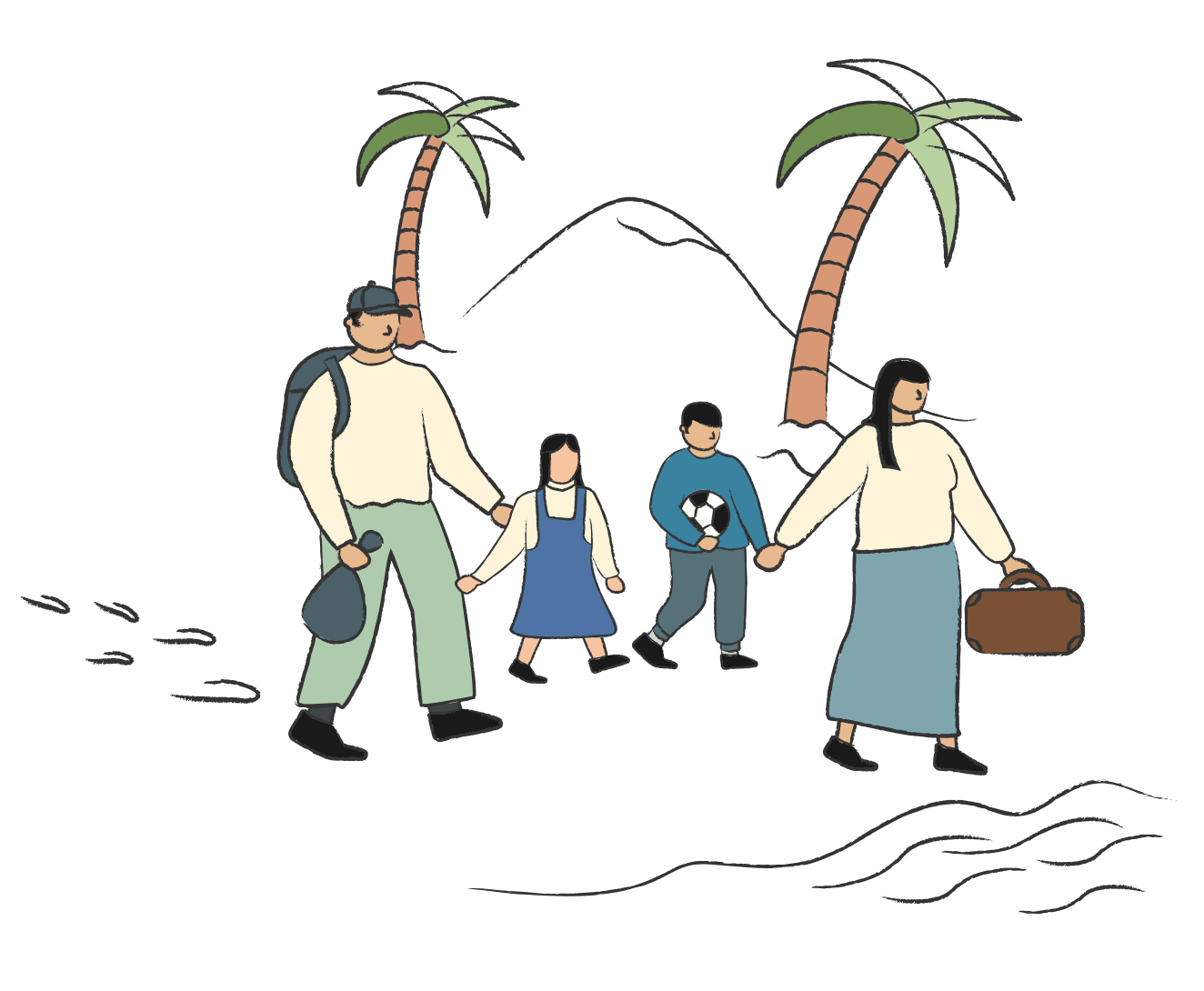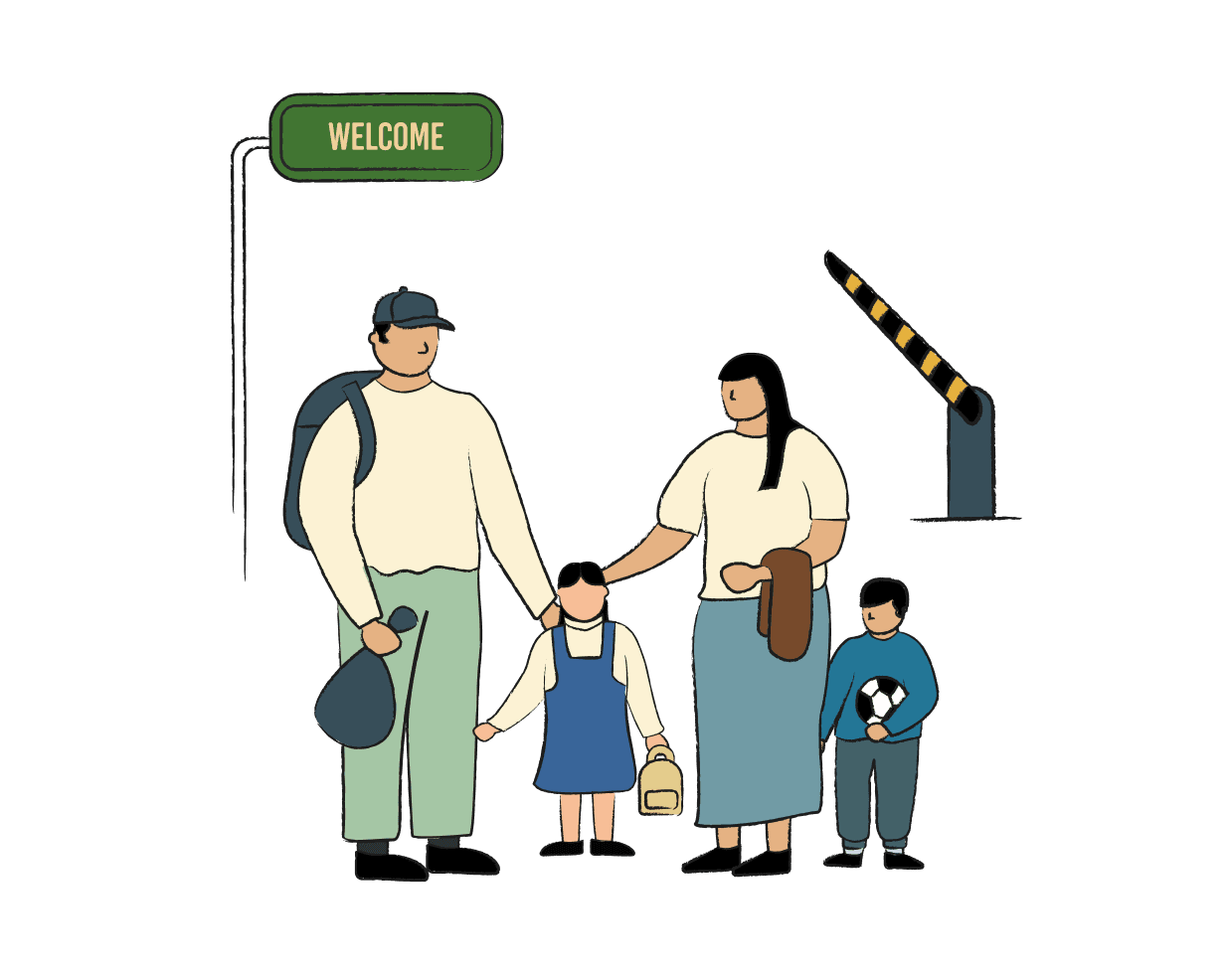Kuja Kuja
Migration Narratives
Main insights & Findings.
This analysis is based on 1,256 semi-structured conversations conducted across seven countries between September and November 2024. These conversations prioritized open-ended, qualitative dialogue to understand migrants' lived experiences and perspectives in depth.


- 54.99% cited 'Better Opportunities'.
- 52.84% mentioned 'Dire Economic Conditions'.
- 18.59% referenced 'Job Loss and Unemployment'.

- Important for 32.62% of total participants.

- 21.51% of all participants mentioned violence and crime as motivation.

- 66.26% of total participants reported lacking necessary documents, referring to a range of missing documents, from basic identification to specific paperwork required for legal migration pathways.
- 35.95% stated that lack of documentation directly influenced their choice of migration route.
Most participants described migration as a deliberate process, with varying decision timelines:
- 54.16% decided within six months of first considering migration.
- 30.56% took more than a year to finalize their decision.

Prior migration experience shaped participants perceptions of opportunities and barriers.
- Among Venezuelan participants (62.7% of the sample), 54.36% reported previous migration experience, compared to 12.26% of participants from other nationalities.
- While past migration sometimes helped migrants navigate challenges by increasing familiarity and access to networks, it did not always make decisions easier—some gained confidence, while others encountered new uncertainties and barriers.

- Family networks, which provided both information and financial support
- Community contacts, offering guidance based on firsthand experience
- Employers in destination countries, functioning as pull factors through job opportunities


- 71.28% of participants relied on family and friends for migration information.
- 30.85% cited broader community networks (neighbors, acquaintances).
- These sources were particularly crucial for migrants who participated in conversations on irregular routes (34.38%).

- 52.66% of study participants used platforms like TikTok, Facebook, and WhatsApp.
- 37% of study participants specifically cited TikTok and Facebook as primary information sources.

- Only 7.89% of participants consulted official sources, NGOs, or humanitarian organizations.
- Formal source usage dropped to just 4.3% among those who shared their experiences on irregular route migrants.

- Women (10.97%) vs. men (4.97%).
- Older migrants over 50 (38%) vs. younger migrants (4.49%).

Of those who participated in conversations on irregular routes:
- Only 13.13% were aware about Safe Mobility Offices before migrating.
- Just 18.38% were familiar with other legal alternatives.
- Overall, 87.54% viewed legal pathways as inaccessible or burdensome, despite approximately 80% preferring to migrate legally.
- Overall, 48.89% of total participants expressed confusion or skepticism about available information on legal pathways.

See Information Providers and Knowledge Networks
- Official organizations struggled to effectively communicate with migrants early in their journey. Social media platforms served as vital but unregulated information hubs, sometimes spreading misinformation.
- Migrant community networks filled critical information gaps but with varying accuracy and reliability.


CBP One technical challenges:
[🔗 See Legal and Administrative Facilitators].
Among CBP One users who shared their experiences across all locations:
- 64.5% needed assistance with registration.
- 100% of users aged 40+ reported requiring help with the app.
- 23.64% experienced record deletions.
- 21.21% had to recreate applications due to technical failures.

- 58.26% felt poorly informed about required documentation at the initial stages.
- 16.8% experienced anxiety due to insufficient information.
- 14.93% reported difficulties with the registration platform.
- 12.40% struggled to navigate administrative requirements.
Process timeline and uncertainty concerns:
Among participants in the study who shared their experiences, reported challenges included:
- 51.03% cited prolonged wait times as a major concern.
- Wait times varied significantly among those who self-reported specific durations, with 48.87% waiting 3+ months and only 8.39% receiving confirmed appointments by the time of the interviews
- 24.09% likened the scheduling process to a 'lottery'.
- 70.1% lacked contingency plans for setbacks.

- 48.17% described the process as overly lengthy.
- 63% mentioned unpredictable approval times.
- 41.96% expressed frustration over lack of timely updates.
Support systems for navigating pathways: [🔗 See Legal and Administrative Facilitators]
Participants engaged with both formal institutions and informal networks to navigate the CBP One tool and the Safe Mobility Offices (SMO) process. While formal assistance was available, migrants frequently cited issues such as insufficient communication, unclear initial information, and long waiting periods, contributing to uncertainty and anxiety.

- Shelter staff assisted 21.86% of CBP One users, particularly with technical and logistical challenges.
- Humanitarian and legal support organizations provided guidance to 16.28% of CBP One users, often addressing registration difficulties.
- Formal organizations supporting SMO processes were recognized by 21.28% of applicants for interview facilitation and documentation support, while 12.23% of participants mentioned assistance related to resettlement.
- Financial assistance programs were crucial for 48.36% of SMO applicants, particularly in locations where access to financial support was a determining factor in continuing the process.
Informal networks often filled critical gaps left by formal systems, with family members providing essential support in documentation, finances, and emotional reassurance, while friends and community networks offered guidance, practical assistance, and a sense of solidarity throughout the process.


Young adults dominated migration flow in our sample: 18-39 year-olds constituted 75% of study participants.
Pathway selection differed by age among study participants:
- Older migrants (50+): Represented 7% of the total sample but 11.8% of SMO users and 4.7% of those on irregular routes.
- Young adults (18-29): Comprised 43.8% of those who migrated irregularly.

- 100% of CBP One users aged 40+ reported needing assistance with the application.
- 47% of younger CBP One users (18-29) also needed technical help.
Decision timelines varied by age: Older participants reported longer deliberation periods before migrating.

- Men more frequently traveled alone: 29% of men on irregular routes and 42% of men using CBP One.
- Women rarely traveled alone: 11% of women on irregular routes and 10% of women using CBP One.
- Women more frequently traveled with children but no partner: 39% of women using CBP One and 29% of women using SMO.

- 17.31% of women in the study cited domestic violence as a migration factor.
- Among 138 Mexican, Guatemalan, and Honduran women in the study, domestic violence rates ranged from 30-40%.
- Women emphasized safety concerns more frequently than men (26.22% vs. 16.24%).

- Women were more likely than men to seek legal assistance (64.96% vs. 33.33%).
- Men more frequently relied on friends for support during travel compared to women (37% vs. 16% on irregular routes).

- Higher previous migration experience: 54.36% had migrated before, compared to 12.26% of participants from other nationalities.
- Longer deliberation periods: 66.52% of Venezuelan participants reported taking up to 12 months to make migration decisions.
- Venezuelans comprised 95.4% of SMO participants who shared their experiences.
Participants from different nationalities reported varying decision timelines and motivations.

- Most commonly reported: Visual impairments (44.78%) and walking difficulties (26.87%).
- Disability rates consistent across migration routes (4.62%-5.69%).
- Distinct barriers reported for transportation, documentation, and border crossing.


- 59% of non-Mexican CBP One users who shared their experiences (a group of 155 people) reported first traveling irregularly to Mexico before attempting to schedule an appointment through the app.
- 10.6% of study participants reported previous attempts to regularize their status in other countries before seeking entry into the U.S.

- Urgency and immediate threats (instability, insecurity).
- Inefficiencies and long delays.
- Poor communication and frustration with the process.
- Fear of violence during waiting periods.

Migrants who participated in discussions described developing adaptive strategies that often diverged from official processes:
- Attempting to coordinate group CBP One applications to improve their chances—despite the app being designed for individual or family unit appointments. This belief was widespread among migrants but was not an official or recognized method.
- Finding workarounds for documentation requirements that did not always align with formal application guidelines.
- Seeking support from various actors—both authorized assistants and unauthorized intermediaries—to navigate technical barriers.

- Smugglers and guides in some cases influenced shifts between pathways based on changing conditions
- Shelter providers functioned as information hubs about both legal and irregular options, primarily through interactions among migrants sharing their experiences with different routes
- Formal organizations (NGOs, aid agencies) sometimes facilitated transition between pathways


- Criminal actors were mentioned by 94% of total study participants.
- Among irregular migrants and CBP One users in Mexico, 53.5% (544) individuals reported experiencing direct victimization, with the most commonly reported crimes being:
- Robbery (25.00%)
- Extortion (20.93%)
- Threats (15.55%)
- Kidnapping (12.06%)
Awareness and Victimization Rates Across Locations

- 16.28% of those in locations before the Darién Gap saw it as a major obstacle, rising to 46.90% among a different group in Honduras who had already crossed it.
- Awareness of Mexico’s risks grew from 10.34% among migrants in Colombia to 20% among those in Honduras, reaching 43.85% among another group in Mexico.
- Victimization rates were particularly high among CBP One users in Mexico, with 73.94% reporting security incidents during their journey.

- 44.07% of study participants cited difficulties with harsh terrain, extreme weather, or physical barriers.
- The Darién Gap specifically presented a combination of extreme geographic, criminal, and survival challenges, particularly for those interviewed who had traveled irregularly:
- Within this group, 13.50% specifically mentioned difficulties crossing rivers or navigating mountains
- 18.63% highlighted physical exhaustion leading to severe health issues

- 15.5% of total participants mentioned that legal pathways were costly. In some cases, this perception was exacerbated by the mistaken belief that certain procedures, such as applications for free services, required payment.
- 33.6% of participants on irregular routes and 56.5% of CBP One users in Mexico cited financial challenges.
- Among those who mentioned smugglers, 86.96% reported experiencing financial burdens imposed by these networks.
- 21.04% of participants traveling through irregular routes specifically mentioned choosing land routes due to lower upfront costs

- Limited finances often appeared alongside descriptions of riskier routes and greater exposure to danger.
- Security threats frequently corresponded with economic losses and increased reliance on various actors, particularly among irregular migrants.

This data represents a cross-sectional study of 1,256 migrants interviewed at various points along migration routes during September-November 2024, when both CBP One and Safe Mobility Offices were operational (both programs were discontinued in January 2025). Venezuelan nationals comprised 62.7% of participants, with higher representation in certain pathways.